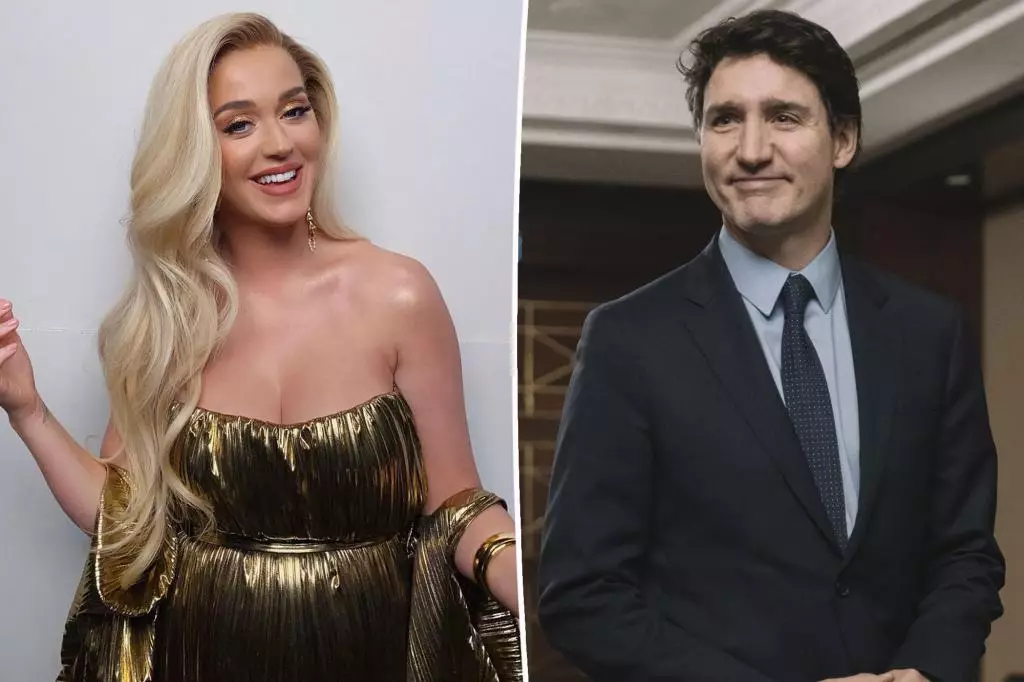The notion of Katy Perry, a global pop icon, and Justin Trudeau, the former Prime Minister of Canada, forming a romantic connection initially strikes as audacious—a celebrity and a political figure from vastly different worlds. Yet, beneath the surface lies a compelling narrative of human connection transcending societal expectations and professional boundaries. Reports suggest that their first encounter was marked by undeniable chemistry, with insiders describing it as a serendipitous moment where “fireworks” ignited. While at face value an affair between a celebrity singer and a politician might seem improbable, it underscores the universality of human desire for companionship, especially among individuals who have navigated the complexities of public life and personal reinventions.
Their instant connection appears rooted in shared values and outlooks, both being characterized as youthful-spirited idealists. Perry’s optimistic musical universe and Trudeau’s passionate advocacy for change suggest a commonality that transcends their distinct careers. This initial spark hints at a deeper compatibility founded on mutual understanding, hope for progress, and the pursuit of personal authenticity—traits that often serve as the foundation for meaningful relationships amidst the chaos of fame and politics.
Timing and Life Stages: Major Hurdles and Opportunities
However, this budding narrative must be scrutinized through the lens of reality. Both Perry and Trudeau find themselves at pivotal junctures—rebuilding their personal lives after significant changes. Trudeau’s recent separation from his wife of 18 years brings new challenges, especially as he navigates the complexities of co-parenting three children. Similarly, Perry’s role as a single mother, raising her young daughter Daisy, adds a layer of responsibility and emotional intricacy. These circumstances serve as both potential barriers and bridges; while geographic distance and demanding schedules complicate sustained romantic pursuits, shared experiences as parents could foster deeper empathy and understanding.
This scenario illustrates a broader truth: modern relationships often require resilience and flexibility in unconventional circumstances. Long-distance romances, especially among high-profile individuals, tend to move slowly—if they develop beyond initial attraction. The presence of exes involved in their children’s lives can be a stabilizing factor, creating a structured environment that allows personal growth without compromising responsibilities. Yet, they must also contend with the inevitable questions of timing, privacy, and the societal gaze—all of which heighten the stakes and complicate affairs of the heart.
The Power of Public Perception and Media Scrutiny
Media portrayal casts a long shadow over the potential relationship. Public interest and curiosity around Perry and Trudeau have been piqued by their recent sightings—dining in Montreal, strolling with Perry’s dog, and Trudeau’s visible support at her concert. These fleeting moments fuel speculation, but they also invite scrutiny into their motives and potential intentions. Clearly, their interactions are under constant watch, and the pressures of living in the public eye can make genuine connection elusive or performative.
Yet, this environment also offers an opportunity for authentic expression—allowing them to reveal who they are beyond the political or celebrity personas. If their relationship persists, it could challenge societal stereotypes about where meaningful connections can occur and who is entitled to love and companionship at any stage of life. The juxtaposition of fame and political influence amplifies the narrative’s intrigue, suggesting that even in worlds of power and prestige, vulnerability and desire remain universal.
Challenging Norms and Embracing Unconventional Love
In contemplating their potential union, it becomes essential to recognize the broader implications of such a union. At a time when societal expectations about relationships are rapidly evolving, Perry and Trudeau exemplify how unconventional matches can redefine what it means to find happiness and fulfillment. Their story, if it progresses, could serve as an inspiring testament to the idea that love is not constrained by labels, professions, or public scrutiny.
Their shared idealism and resilience hint at a deeper truth: genuine human connection often arises in unlikely places and at unexpected moments. Despite the complexities they face—distance, responsibilities, media attention—their willingness to explore what might be possible hints at a broader narrative about hope, personal growth, and the relentless pursuit of genuine happiness.
As they navigate this uncharted territory, their story challenges us to reconsider our assumptions about where love can flourish and reminds us that beneath the surface of fame and politics lies a fundamental human longing for companionship, understanding, and the chance to find joy amid chaos.

